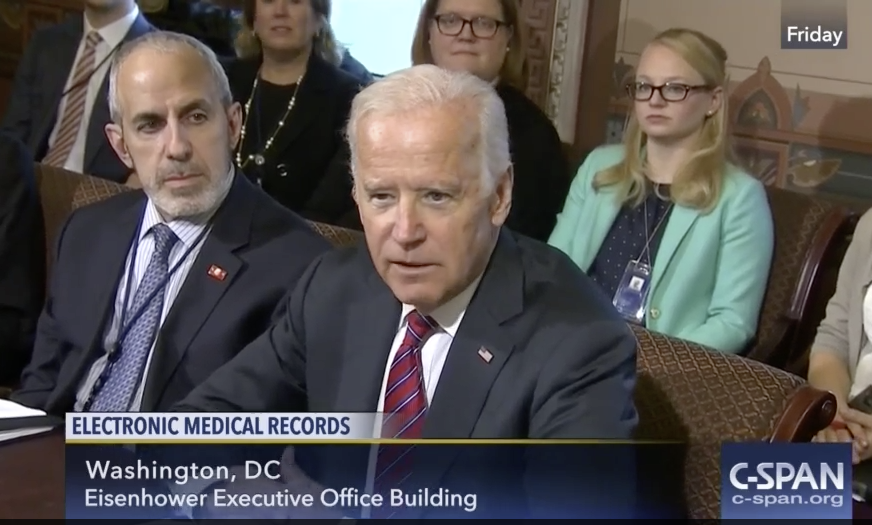Office of the National Coordinator (ONC)
See the following -
Is The 1.5+ Trillion Dollar HITECH Act a Failure?
 Hopefully, the public statements made by President Obama and Vice President Biden will lead to a public debate over the monumental problems that the HITECH Act and proprietary EHR vendors have caused the American people. While the press continues to report the figure of $35 billion as the cost of implementing EHRs, that figure does not tell the entire story. Perhaps the next step is to provide accountability and transparency. That would start with firm numbers regarding the real costs of EHR implementations forced on an unprepared healthcare system by the HITECH Act.
Hopefully, the public statements made by President Obama and Vice President Biden will lead to a public debate over the monumental problems that the HITECH Act and proprietary EHR vendors have caused the American people. While the press continues to report the figure of $35 billion as the cost of implementing EHRs, that figure does not tell the entire story. Perhaps the next step is to provide accountability and transparency. That would start with firm numbers regarding the real costs of EHR implementations forced on an unprepared healthcare system by the HITECH Act.
- The Future Is Open
- Login to post comments
Leveraging The S&I Framework To Improve Collaborative Care
With the concept of collaborative care now at the forefront of the healthcare industry, organizations are working to improve the functionality and interoperability of health IT systems. To facilitate the meaningful exchange of clinical and financial information, however, it is essential for various technologies within and among organizations to effectively communicate.
- Login to post comments
New Technology Makes EMRs Easier, Searchable, More Secure
 According the the Office of the National Coordinator, roughly 30% of providers have no Health Information Exchange outside of faxing. Medal’s innovative technology “meets providers where they are." Medal makes it easy to share data with its product “print to FHIR." Medal software replaces existing fax-based workflows and streamlines health information sharing, creating opportunities to improve health care, reduce effort, and assist research. Medal also connects to existing health information systems such as EMRs and HIEs using FHIR -- “Fast Healthcare Interoperability Resources” -- a quickly emerging standard for health information sharing.
According the the Office of the National Coordinator, roughly 30% of providers have no Health Information Exchange outside of faxing. Medal’s innovative technology “meets providers where they are." Medal makes it easy to share data with its product “print to FHIR." Medal software replaces existing fax-based workflows and streamlines health information sharing, creating opportunities to improve health care, reduce effort, and assist research. Medal also connects to existing health information systems such as EMRs and HIEs using FHIR -- “Fast Healthcare Interoperability Resources” -- a quickly emerging standard for health information sharing.
- Login to post comments
Notes on the June Meeting of the HIT Standards Committee
The June HIT Standards Committee focused on an update and evaluation of the standards and interoperability framework initiatives, consistent with the overall theme of ONC’s recent reorganization and strategic plan to focus on fewer goals with a greater depth. Steve Posnack, who now leads the ONC Office of Standards and Technology, introduced the topic... Read More »
- Login to post comments
Notes on the October Joint Meeting of the Standards and Policy Committee
Today the future of interoperability was discussed and endorsed by a joint meeting of the Standards and Policy Committees. We began with a preamble clearly stating that the roadmap we’re working on is a process not a finished product. Karen DeSalvo, Jacob Reider, Paul Tang and I offered framing comments for the day... Read More »
- Login to post comments
Obama and Biden Blast EHR Vendors for Data Blocking
 As they are winding their terms in office, President Barack Obama and Vice President Joe Biden dropped a stink bomb on the health IT industry. Speaking at different events on Friday, January 9th, the President and Vice President both criticized proprietary electronic health record (EHR) vendors as the primary obstacle to the success of their administration’s health care strategy. This is the highest level acknowledgment so far of the serious impact that “lock-in” EHR software vendors are having on America’s medical infrastructure and the ability of physicians to provide medical care.
As they are winding their terms in office, President Barack Obama and Vice President Joe Biden dropped a stink bomb on the health IT industry. Speaking at different events on Friday, January 9th, the President and Vice President both criticized proprietary electronic health record (EHR) vendors as the primary obstacle to the success of their administration’s health care strategy. This is the highest level acknowledgment so far of the serious impact that “lock-in” EHR software vendors are having on America’s medical infrastructure and the ability of physicians to provide medical care.
ONC Unveils Rules For Medicare Data Visualization Challenge
Just as the Department of Health & Human Services (HHS) was releasing Medicare provider utilization and payment data to the public, the Office of the National Coordinator for Health Information Technology (ONC) was looking for ways to make these data from the Centers for Medicare & Medicaid Services (CMS) meaningful to consumers.
- Login to post comments
Open Health Round-Up For 2014: Notable Articles, Reports, And Events
Even the hidebound field of health care can undergo a lot of change over the course of one year. Key health IT trends that I saw throughout 2014 are summarized in another article. Here I'll list some of the most notable articles and reports related to open source, standards, and transparency in health. Read More »
Open Source Electronic Health Records For Education And Training
 In spite of being very involved in the field of Health Informatics I only recently became aware of VistA for Education (VFE), which has all of the aforementioned attributes of an excellent solution for EHR education purposes. VFE was developed as a result of a grant from the Office of the National Coordinator (ONC) to supplement the ONC Health Information Technology (HIT) curriculum. Electronic health records (EHRs) are more than just the electronic equivalent of paper-based health records. Electronic health data is easier to search, share and archive, compared to paper records. Additionally, EHRs can be embedded with clinical decision support to alert and remind physicians of patient safety and preventive medicine measures.
In spite of being very involved in the field of Health Informatics I only recently became aware of VistA for Education (VFE), which has all of the aforementioned attributes of an excellent solution for EHR education purposes. VFE was developed as a result of a grant from the Office of the National Coordinator (ONC) to supplement the ONC Health Information Technology (HIT) curriculum. Electronic health records (EHRs) are more than just the electronic equivalent of paper-based health records. Electronic health data is easier to search, share and archive, compared to paper records. Additionally, EHRs can be embedded with clinical decision support to alert and remind physicians of patient safety and preventive medicine measures.
States, Vendors Form Workgroup to Up EHR/HIE Adoption
Today, the EHR/HIE Interoperability Workgroup, originally formed by the New York eHealth Collaborative (NYeC), will announce the collaborative work of seven states (California, Colorado, Maryland, Massachusetts, New Jersey, New York, and Oregon), eight EHR vendors (Allscripts, eClinicalWorks, e-MDs, Greenway, McKesson Physician Practice Solutions, NextGen Healthcare, Sage, and Siemens Healthcar Read More »
- Login to post comments
The Changes at ONC and Next Steps
In 2014, there have been many changes at the Office of the National Coordinator. Although I do not have access to an organizational chart, I believe the leadership of ONC and the changes in 2014 are as follows... Read More »
- Login to post comments
The Importance of High Quality Data for Artificial Intelligence Reliability
 Artificial Intelligence (AI) is a hot topic right now in medical practice. Though there are many reasons why AI solutions have become so popular, one of the biggest reasons is that AI has the potential to reduce clinical burnout and fatigue by improving Clinical Decision Support in electronic health record (EHR) systems. To understand how this can be achieved, we must first understand what AI is and how it works...For Healthcare, AI and Machine Learning algorithms must rely on copious amounts of granular, high-quality data.
Artificial Intelligence (AI) is a hot topic right now in medical practice. Though there are many reasons why AI solutions have become so popular, one of the biggest reasons is that AI has the potential to reduce clinical burnout and fatigue by improving Clinical Decision Support in electronic health record (EHR) systems. To understand how this can be achieved, we must first understand what AI is and how it works...For Healthcare, AI and Machine Learning algorithms must rely on copious amounts of granular, high-quality data.
- Login to post comments
The ONC 10 Year Vision
On June 5th 2014, ONC released “Connecting Health and Care for the Nation: a 10-Year Vision to Achieve an Interoperable Health IT Infrastructure." The plan is divided in 3 year goals, 6 year goals, and 10 year goals. Five specific tactics support the strategies. Below is a summary of the report and a few comments from my Massachusetts experience that support the reasonableness of the ONC goals.
- Login to post comments
The ONC Reorganization
Many people have asked me to explain the recent reorganization at ONC, reducing 17 different offices to 10...Simply, the era of stimulus has ended and ONC no longer has the operating budget to do as many projects as fast as during the era of ARRA... Read More »
- Login to post comments
The Politics of the EHR: Why we’re not where we want to be and what we need to do to get there
 By now, it seems abundantly clear that the vast potential offered by universal adoption of electronic health records (EHR) has not been achieved. Indeed, the fulfillment of that potential seems a long way off. Unsolved problems with interoperability, usability, safety, and security, to name a few, remain, and continue to pose barriers to universal adoption. There is ample evidence in the medical literature, of the unsolved problems of the EHR. Indeed, two recent reports that offer (probably inadequate) solutions highlight the difficulties that exist with the EHR. The proliferation of these problems has only increased with the increase in adoption of the EHR by physicians and institutions. The Texas Medical Association has asked the (at the time) ONC, Farhad Mostashari, MD, to establish a health IT patient safety czar.1 Read More »
By now, it seems abundantly clear that the vast potential offered by universal adoption of electronic health records (EHR) has not been achieved. Indeed, the fulfillment of that potential seems a long way off. Unsolved problems with interoperability, usability, safety, and security, to name a few, remain, and continue to pose barriers to universal adoption. There is ample evidence in the medical literature, of the unsolved problems of the EHR. Indeed, two recent reports that offer (probably inadequate) solutions highlight the difficulties that exist with the EHR. The proliferation of these problems has only increased with the increase in adoption of the EHR by physicians and institutions. The Texas Medical Association has asked the (at the time) ONC, Farhad Mostashari, MD, to establish a health IT patient safety czar.1 Read More »
- Login to post comments